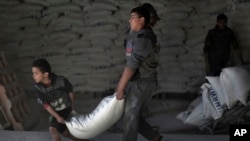The U.N. Relief and Works Agency, known as UNRWA, is appealing for $1.2 billion to provide humanitarian aid throughout the coming year for 5.4 million Palestinian refugees across the Middle East.
In the wake of a decision last year by the Trump administration to cut the United States' $300 million contribution to UNRWA, the agency found relief from the 2018 shortfall through additional donations from other countries and institutions.
The UNRWA Commissioner General Pierre Krahenbuhl said he hopes donors will maintain those same levels of contributions this year, as Palestinian refugees scattered in encampments in the West Bank, East Jerusalem, Gaza, Jordan, Lebanon and Syria face a range of daunting obstacles.
"Central to those challenges and pressures is the ongoing occupation in the Palestinian territory, the blockade of Gaza and the levels of violence that we have experienced there with incursions, but also lack of freedom of movement," Krahenbuhl said. "We have seen very limited employment opportunities, increased food insecurity and, in particular ... the alarming deterioration of psycho-social conditions in these contexts."
One of the greatest concerns for Palestinian refugees is the lack of a political future, Krahenbuhl told VOA, adding that young people in Gaza have little hope for what lies ahead.
In addition, he said, Israeli and Palestinian communities rarely interact with each other.
"If you grow up in Gaza, you do not meet Israelis. And frankly speaking, young Israelis very rarely meet Palestinians today. How this can be a contribution to future stability in the region is something that I just cannot see."
Krahenbuhl warned that the situation in the region remains extremely volatile. Preserving the key services in the difficult and polarized regions of the Middle East will require sustained and generous funding from donors, he said.





